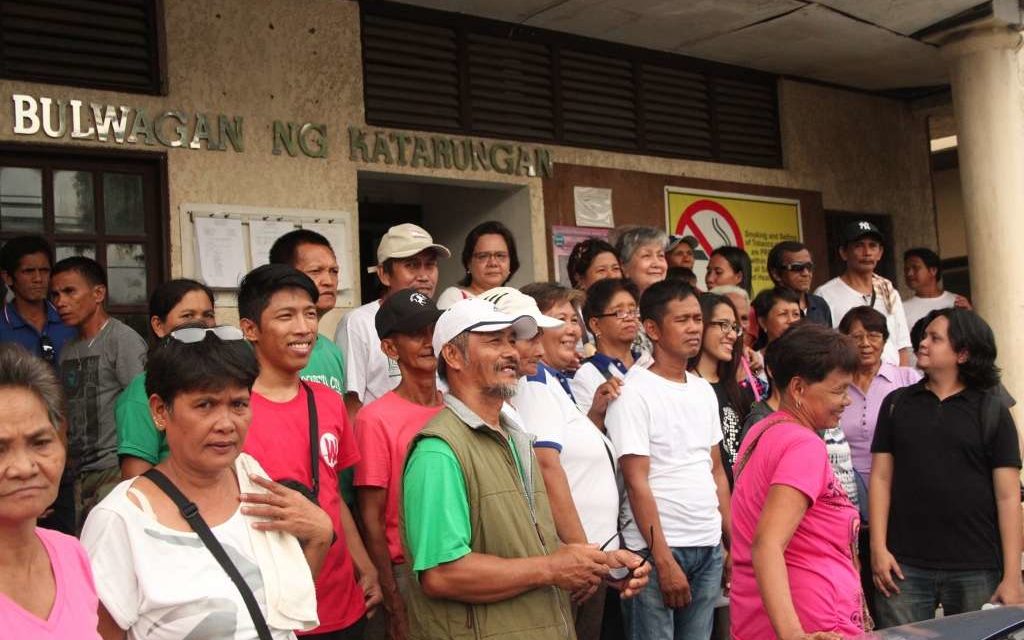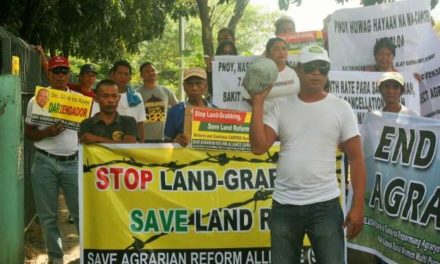An outburst of applause erupted in the local courtroom from among the accused farmers of Barangay (village) Sumalo and their supporters when the non-guilty verdict was read by the clerk of court. The jubilation diminished into hushed sighs after the public prosecutor reproached the public for forgetting court decorum. But when the farmers walked out of the Hall of Justice of Dinalupihan City, Bataan province, north of Manila, they could no longer hold back tears of joy, especially the women.
Of the 28 farmers accused of committing “grave coercion” against security guards of Riverforest Corporation in Sumalo, Hermosa, Bataan, 19 are mothers. One of them is a 70-year old woman; two of the males have already died.
According to court decision rendered June 16 , the prosecution’s evidence was weak and thus failed to prove beyond reasonable doubt the guilt of the accused.
“Two decades in the land struggle, the farmers in Barangay Sumalo have learned to cope and fight against intimidations and other atrocities committed by the armed security groups of Riverforest,” said Rolando Martinez, Sumalo’s Barangay Captain. “We have had to stomach a lot; from the destruction of crops and livestock to death threats. But out of all that we have faced, the hardest to accept is the possibility of criminalizing those who fought dearly for their right to the land.”
The grave coercion cases were filed by the security guards of Riverforest when said farmers resisted the entry of materials that would be used for the construction of fences that would enclose parts of a 213-hectare property with a pending agrarian reform case.
“How can a 70-year old woman coerce an armed security guard?” lamented Fe Andulan, leader of the Sumalo farmers’ organization Samahan ng mga Nagkaka-isang Mamamayan ng Barangay Sumalo (Sanamabasu). “All we wanted was to settle first the issue of their ingress and egress to our tillages, before the fencing operation.”
The enclosures made of barbed or razor wires were eventually erected and have since hindered hundreds of families from continuing to farm the land. The farmers have been prohibited from entering their tillages, depriving them their right to work on their farms or even harvest crops. “We have endured this situation for more than six years and now the survival of our families are even more threatened as we face the possibility of incarceration,” said Belinda Petines, a woman farmer with seven criminal/civil cases in her name before the promulgation on June 16.
Enclosing lands to forcibly evict, dispossess, or to induce displacement is not an entirely new phenomenon to farmers who call this “land grabbing” in order for corporations to assert control. Landowners resorting to “legal harassment” or the act of lodging numerous criminal cases to maim or dwindle the strength of dissenting farmers’ groups are common cases in agrarian disputes.
“With the acquittal of the 28 farmers, justice has indeed prevailed,” said lawyer Jesus Torres of the Philippine Commission of Human Rights who stood as legal counsel of farmers in the criminal case. “For the vulnerable, weak, and marginalized, there is still hope in our justice system”.
The favorable verdict gives the Sumalo farmers a moment of respite from odds posed by the agrarian case, this time against Riverforest. Optimism remains so that small victories are seen to lead towards the much awaited happy ending to their struggles.









